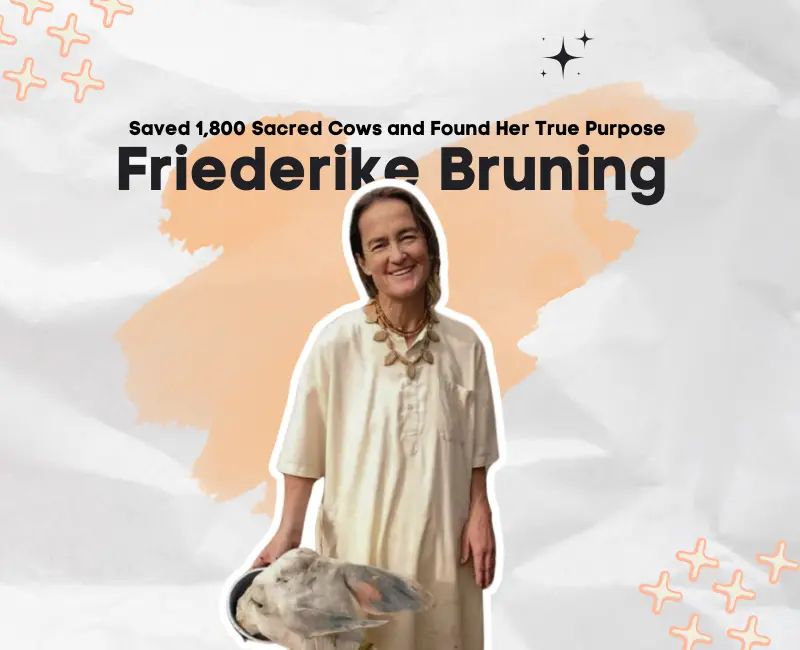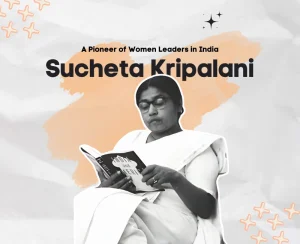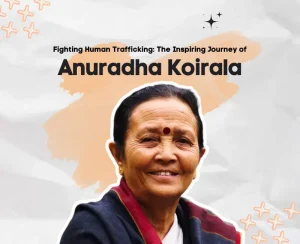How Friederike Bruning Saved 1,800 Sacred Cows and Found Her True Purpose

In 1978, a 20-year-old German woman landed in India searching for a yoga teacher. What she found instead was her life’s calling – one that would transform her from Friederike Irina Bruning into ‘Sudevi Mataji,’ the guardian angel of thousands of abandoned and injured cows in Uttar Pradesh.
Her story isn’t just about animal welfare; it’s a testament to how one person’s unwavering dedication can create ripples of change that transcend cultures, borders, and conventional wisdom.
Four decades later, with a Padma Shri award from the Indian government and over 1,800 cows under her care, Bruning’s journey from a furniture designer in Berlin to running one of India’s most respected cow shelters in Mathura reads like a modern-day legend.
But behind the accolades lies a daily ritual of profound dedication – waking up at 3:30 AM, managing a team of 60 workers, and ensuring every cow receives medical attention, food, and, most importantly, dignity.
‘These cows are not just animals to me,’ says Bruning. ‘They are my family, teachers, and connection to something far greater than myself.’
Would you like to know more about her? Continue reading the full article.
Early Life and Journey to India (1958-1978)
Born into a prosperous family in Berlin, Friederike Irina Bruning seemed destined for a conventional life of European comfort. As the daughter of a successful businessman, she had access to the best education and was building a promising career in furniture design. Yet, something was missing.
“I had everything materially, but spiritually, I felt empty,” Bruning recalls her early years. “There was this persistent feeling that my life’s purpose lay elsewhere.”
In 1978, following an inner calling she couldn’t quite explain, 20-year-old Bruning packed her bags for India. Her parents thought she was joining the growing wave of Western youth seeking Eastern spirituality – a temporary adventure that would last a few months at most.
The Transformative Encounter (1978-1980)
What started as a search for a yoga teacher in Vrindavan became a profound spiritual awakening. During her initial months in India, Bruning encountered her first injured cow on the streets of Mathura.
“That moment changed everything,” she says. “The cow was suffering from a deep wound, yet there was such gentleness in its eyes. I couldn’t walk away – not then, not ever.”
Using her savings, Bruning arranged for the cow’s treatment. One cow led to another, and soon, she spent more time caring for injured cattle than practicing yoga.
Building Radha Surabhi Goshala: A Labor of Love (1980-1996)
With an inheritance of approximately €200,000, Bruning channeled her resources and commitment to establish Radha Surabhi Goshala in Mathura.
Her goal was simple yet profound: to create a sanctuary where abandoned and ailing cows could live with dignity, compassion, and care. This undertaking would become her life’s mission and the goshala’s legacy.
However, the path to building Radha Surabhi Goshala was far from smooth. Bruning faced numerous challenges, each more complex than the last, but her resilience and devotion to the welfare of cows saw her through.
Overcoming Challenges
Starting the goshala in India required navigating various hurdles:
- Language Barriers: Bruning’s lack of fluency in Hindi made communication a constant struggle. Over time, she immersed herself in the local language and culture, building trust with the community.
- Cultural Differences: Transitioning from her European roots to rural Indian life required an immense cultural shift. She adopted Indian customs, clothing, and practices, embracing the traditions and sensitivities of the community she served.
- Bureaucratic Hurdles: As a foreigner, Bruning encountered countless bureaucratic obstacles. Legal documentation, land acquisition, and maintaining the goshala’s permits required time, patience, and perseverance.
- Limited Resources: Despite her initial inheritance, funding quickly became a concern. The care of rescued animals, medical supplies, shelter expansion, and feeding costs strain her finances. She often made personal sacrifices to ensure the cows had everything they needed.
- Skepticism from Locals: At first, many locals were skeptical of Bruning’s intentions and questioned why a foreign woman would be so invested in the welfare of cows. Over time, her genuine dedication won the respect and support of those around her.
Developing Systematic Approaches to Animal Care
Through experience and determination, Bruning developed structured protocols to ensure that her goshala provided consistent, high-quality care:
- Medical Treatment Protocols: Working with local veterinarians, she established a set of medical protocols tailored to treat the common ailments of abandoned cows. She set up a small infirmary within the goshala to care for the most vulnerable animals.
- Feeding Schedules: Bruning recognized the importance of proper nutrition and developed a feeding schedule that addressed the dietary needs of each animal. This approach ensured that every cow received balanced nutrition regardless of age or health.
- Waste Management: Handling the waste of hundreds of animals requires careful planning to maintain hygiene and environmental sustainability. She implemented waste management systems, including composting, which provided nutrient-rich manure for local farmers.
- Staff Training: Finding people who shared her passion and dedication was challenging, but Bruning trained her staff to follow her care protocols meticulously. She instilled in them the values of compassion and respect, transforming them into a team committed to the goshala’s mission.
- Community Engagement: Bruning worked tirelessly to educate and engage the local community. She conducted outreach programs to raise awareness about animal welfare and sought support from local authorities and residents. Gradually, the goshala became a respected institution in the community.
Daily Life at the Goshala – A Sheer Dedication
A typical day in Bruning’s life reveals her extraordinary commitment:
- 3:30 AM – Wakes up
- 4:00 AM – Morning prayers
- 4:30 AM – First round of checking on sick cows
- 5:00 AM – Supervising milk collection
- 6:00 AM – Organizing medical treatments
- 7:00 AM – Meeting with veterinarians
- 8:00 AM – Overseeing feed distribution
[…continues throughout the day]
“People often ask if I get tired,” she says with a smile. “How can you get tired when you’re doing what you love? Each cow here has a name, a personality, a story.”
Impact Beyond Animal Welfare
Bruning’s work has created ripples far beyond animal care:
Employment Generation:
Through her gaushala, Bruning has become a key employer in the region, offering stable job opportunities and valuable skills to the local community:
- 60 Full-Time Local Staff: Her shelter employs around 60 full-time staff members, offering them a stable income and a meaningful occupation in animal welfare.
- Indirect Employment for 100+ Families: The economic benefits of her shelter extend beyond direct employees. Over 100 families indirectly benefit from her shelter’s operations, as it stimulates local businesses that supply feed, equipment, and other essentials.
- Skills Training for Local Youth: Bruning’s work also allows young people to learn animal care, veterinary assistance, and shelter management skills. This experience improves students’ employment possibilities while also raising community awareness about animal welfare.
Community Development:
Bruning’s work has become a community development pillar, fostering health, education, and support for local families.
- Free Veterinary Camps for Local Farmers: Bruning recognizes the limited access to veterinary care in rural areas and organizes free veterinary camps. These camps offer essential healthcare services to local farmers’ cattle, improving livestock health and productivity in the community.
- Education Programs About Cattle Care: Bruning has initiated workshops for local farmers and families, teaching them about animal health, humane treatment, and sustainable livestock care. This empowers the community to care better for their animals and builds a more compassionate culture.
- Support for Underprivileged Families: Through various outreach programs, Bruning’s Gaushala provides essential support to underprivileged families in the area, including food and resources, especially in times of need. Her contributions reinforce a sense of unity and upliftment, further extending her mission of compassion to people in the community.
Recognition and Challenges
In 2019, she was awarded Padma Shri, one of India’s highest civilian honors, for her exceptional contribution to animal welfare.
The recognition served not only as an acknowledgment of her selfless service but also as a spotlight on the issues surrounding animal welfare in India.
This award, however, was more than just a personal achievement for Bruning. It was a beacon for countless animal lovers, volunteers, and NGOs in similar fields.
Her recognition brought international attention to the plight of India’s cows and inspired many others to support or start initiatives to protect and care for these sacred animals.
But Bruning remains humble:
“Awards are nice, but my real reward is seeing an injured cow recover and thrive. That’s worth more than any medal.”
Challenges remain constant:
- High Monthly Expenses
Running the shelter costs over ₹35 lakh each month, covering food, medical care, and staff salaries. With so many animals in need, funding is a constant challenge, limiting opportunities for improvements and expansion.
- Increasing Number of Abandoned Cows
More and more abandoned cows arrive regularly, often sick or injured. This puts additional pressure on resources, as each animal needs proper space, food, and care.
- Limited Room for Growth
The shelter is running out of space. While Bruning wants to expand to take in more animals, limited land and local restrictions make this problematic, resulting in overcrowding.
- Need for Modern Medical Equipment
Many cows need urgent medical care, but the shelter lacks advanced equipment like X-rays or ultrasound machines. Having better equipment would allow for faster and more effective treatment.
Philosophy and Vision
Bruning’s approach to service transcends religious boundaries:
“This isn’t about religion – it’s about compassion. When you serve with pure intention, all barriers dissolve. These cows don’t care if I’m German or Indian; they respond to love.”
Her philosophy centers on three principles:
- Unconditional Service
- Sustainability
- Community Integration
Looking Forward: The Legacy
At 65, Friederike Irina Bruning’s vision for her mission stretches beyond her lifetime. She dreams of a sustainable future for animal welfare that will carry her work forward and inspire new generations.
Her legacy is one of practical compassion, filled with plans to ensure that the values she lives by will continue long after she is gone.
Training the Next Generation
A cornerstone of Bruning’s vision is preparing future animal welfare advocates. She has begun mentoring young animal welfare workers, imparting the values and practices she has refined over decades.
Bruning hopes to create a foundational guide for others in the field by documenting best practices for running and managing shelters like her gaushala.
Her efforts include developing sustainable management systems to ensure the shelter’s long-term efficiency and viability.
This focus on education and mentorship is designed to empower new generations to take her mission forward.
Expansion Plans for a Sustainable Future
Bruning’s plans include expanding her shelter to address more comprehensive needs.
She envisions the creation of modern medical facilities that can provide high-quality care to sick and injured animals.
Additionally, she hopes to establish a training center dedicated to cattle care that will educate others in humane and effective animal management.
Her ambitions include a research facility that explores the many benefits and uses of cow-based products, creating a pathway for innovative, respectful ways to integrate animal welfare with sustainable practices.
Lessons in Dedication
Friederike Irina Bruning’s journey offers timeless lessons in dedication and purpose, inspiring others through the strength of her beliefs and actions:
- Purpose Transcends Comfort: Bruning’s life is a testament to living with purpose over personal comfort, as she has sacrificed countless conveniences to serve a cause larger than herself.
- Impact Requires Persistence: Her journey underscores that true impact is achieved through relentless perseverance, even in the face of significant obstacles.
- Love Knows No Boundaries: Crossing cultural, geographic, and language barriers, Bruning has shown that love and compassion are universal.
- Service Brings Fulfillment: Bruning has found a deep sense of fulfillment beyond material gains through her unwavering service.
- Age Is No Barrier to Starting Anew: Her story proves that it is never too late to pursue a passion and that age should not limit anyone from starting or sustaining meaningful work.
Through her vision, resilience, and wisdom, Friederike Irina Bruning continues to inspire hope. She shows us that a legacy rooted in compassion is powerful and enduring.
Her dedication ensures that her values and mission will be a guiding light for future generations.
Making a Difference
For those inspired by Bruning’s story, she offers simple advice:
“Start where you are, with what you have. One act of kindness can multiply beyond imagination. I began with one cow, and look where love has led me.”
Today, Radha Surabhi Goshala needs support more than ever.
For those inspired by Friederike Irina Bruning’s story, there are several ways to support her mission:
- Donate to Surabhi Gaushala: Contributions, both big and small, make a significant impact in providing food, shelter, and medical care for the animals.
- Volunteer at a Local Shelter: If you can’t visit Vrindavan, consider supporting a local animal shelter or gaushala.
- Adopt or Sponsor an Animal: Many shelters offer sponsorship programs through which you can support an animal’s care for a specified period.
- Spread Awareness: Sharing her story can inspire others to contribute or volunteer for animal welfare initiatives.
Conclusion
Friederike Irina Bruning’s trip from Berlin to Mathura is more than just a narrative about animal welfare; it demonstrates how following one’s heart may lead to extraordinary results.
Her life reminds us that the greatest achievements often come not from careful planning but from courageous and committed responses to life’s unexpected calls.


